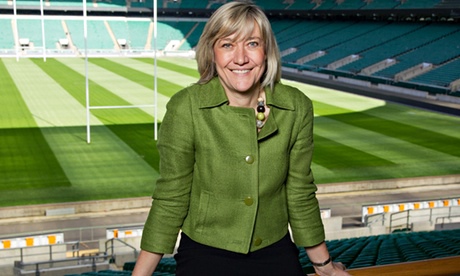
Sport is changing. This list is testimony to that. There are many talented women in sport right now: athletes, broadcasters, politicians, coaches and administrators. Which makes me all the more shocked and surprised to be No1 on this list. I don't think of myself as powerful and I'm genuinely honoured and humbled that others should view me in that way.
I have always believed in women working in sport, at the highest levels. Over a 30-year career in sport I have at times had to ignore the gender stereotypes and press on. Thankfully those stereotypes are fading. When the RFU appointed me to this role it did not send shockwaves through the sport because I am a woman. That may surprise people because rugby is often thought of as male dominated. Truthfully I am not even sure how many people noticed that I am the first woman to lead a Rugby World Cup.
Women in sport is not rocket science. Women make up 50% of the population. Ignoring one half of the talent pool in this country does not make good business sense. Getting more women into senior positions in the sports industry is not a "female thing". It is just common sense. The fact that our Rugby World Cup team is 50% female is great and is a result of interviewing widely and recruiting the best people – men and women – for the job. The barriers so often cited as reasons why women cannot progress in their careers, such as motherhood, are outdated. The workplace is changing. It is dynamic and flexible. In a modern world it needs to be. The leadership of any ambitious organisation has to be open-minded.
In the last three years the number of female chief executives of sports federations has actually gone down. To try to accelerate a long overdue process of better representation for women in senior positions in sport, UK Sport and Sport England set a target for all sports governing body boards to be made up of 25% female directors by 2017. For most of my life I have actively disagreed with targets and quotas for women but where a target can be helpful is that it shows ambition. And that is important.
Is 25% ambitious enough? I do not think so. Surely we have to be aiming at 50%, to reflect the population. I am absolutely not saying give women jobs for the sake of it. I would never advocate that. But I do think we need to create the opportunity for women to shine. And that is about sports organisations proactively encouraging women to join their workforce. Seeking out female talent when they are recruiting. The talent is out there, the problem is that too often the default position is to see jobs in sport as male. When you think of the many remarkable women working in British sport right now that attitude is misplaced. Just look at the talented women on this list.
I have been in sport my whole life – as an athlete, a broadcaster, running my own sports consultancy company, working at international federations, as director of sport at London 2012, and now here as CEO of the Rugby World Cup 2015. I believe that being an athlete has given me an essential skillset that translates into running an organisation. That is not just my view, a report published in America last year told a compelling story of women with sports backgrounds – from Hilary Clinton to Christine Lagarde – reaching senior positions in their industry.
I know absolutely that my own career as a tennis player has influenced the way I work today. As a player you could never go on court with anything left in doubt. If I hadn't practised my backhand 200 times to take the ball earlier, I would be exposed in a match situation. The same thinking was applied in delivering the Olympic and Paralympic Games. We did not leave a stone unturned. And that is why I believe I have been successful in my career. I am always looking to learn and to improve – it is the athlete in me.

